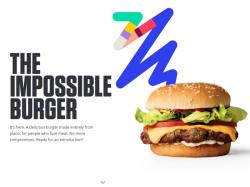Impossible Foods Debuts In New England
October 3, 2017 | 4 min to read

CAMBRIDGE, Mass. – The Impossible Burger will make its New England debut tomorrow at the award-winning fast-food concept Clover Food Lab.
Clover is the brainchild of Massachusetts Institute of Technology and Harvard University alum Ayr Muir, a distant cousin of 19th century environmentalist John Muir. Clover’s goal is to decrease the environmental footprint of the nation’s growing restaurant sector by making food that’s delicious, nutritious and sustainable.
Clover’s fast-casual dining concept, seasonal menus and unique preparations have won accolades from The Wall Street Journal, The Huffington Post and The Improper Bostonian’s “Best of Boston” competition, among others.
“Clover and Impossible Foods are totally aligned in our mission and vision: to make the global food chain sustainable and robust, one delicious meal at a time,” said Muir, who launched his business with a single food truck on the MIT campus in 2008. “I look forward to growing with Impossible Foods and bringing Impossible’s plant-based meat to all of our restaurants and trucks.”
Starting Saturday, Clover will begin serving the Impossible Burger in a first-of-its-kind meatball sandwich. The meatball sandwich will be available for $12.75, pre-tax, starting Sept. 22 at two Clover locations in Cambridge: 1326 Mass Ave.; and the newest Clover location, a state-of-the-art food lab at Harvard University’s Science Center. (The Science Center is on campus and open to the public.)
Next month, Clover will introduce their meatball sandwich made with Impossible Burger in all restaurants throughout the region. Click here to see the full list of restaurants serving the Impossible Burger.
In addition, Impossible Foods’ CEO and Founder Dr. Patrick O. Brown will hold a question-and-answer session with students at 3 p.m. today at the Harvard University Science Center. From 4:30 to 6 p.m., Boston-area students are invited to sample Impossible Burger at the Clover Food Lab inside the Harvard Science Center.
Big taste, small footprint
Impossible Foods’ plant-based meat is served at about 50 restaurants throughout the United States, including multi-unit restaurant groups Bareburger, Umami and Hopdoddy. Just last week, the Impossible Burger debuted at B Spot — a chain of burger restaurants in Ohio, Michigan and Indiana owned by award-winning Chef Michael Symon.
In development since 2011, the Impossible Burger is the world's only burger that handles, smells, cooks and tastes like ground beef from cows — but is made entirely from plants, with a much smaller environmental footprint than meat from animals.
The Impossible Burger is produced without hormones, antibiotics, cholesterol or artificial flavors. It uses about 75% less water, generates about 87% fewer greenhouse gases and requires around 95% less land than conventional ground beef from cows.
The Impossible Burger is made from simple ingredients found in nature, including water, wheat protein, coconut oil and potato protein. One special ingredient — heme — contributes to the characteristic taste of meat and catalyzes all the other flavors when meat is cooked. Impossible Foods discovered how to get heme from plants, transforming the Impossible Burger into a carnivore’s delight that’s light on the planet.
Impossible Foods launched production in September at its first large-scale manufacturing plant. To learn more about Impossible Foods’ plant in Oakland, watch this video. As the Oakland, Calif., plant ramps up over the next several quarters, more and more restaurants will begin serving Impossible Burgers — including in Boston. The company is also developing additional plant-based meat and dairy products.
About Impossible Foods:
Based in Redwood City, California, Impossible Foods makes delicious, nutritious meat and dairy products directly from plants — with a much smaller environmental footprint than meat from animals. The privately held company was founded in 2011 by Patrick O. Brown, M.D., Ph.D., formerly a biochemistry professor and Howard Hughes Medical Institute investigator at Stanford University. Investors include Khosla Ventures, Bill Gates, Google Ventures, Horizons Ventures, UBS, Viking Global Investors, Temasek and Open Philanthropy Project.
More information:
impossiblefoods.com
www.twitter.com/impossiblefoods
www.facebook.com/impossiblefoods
Source: Impossible Foods
